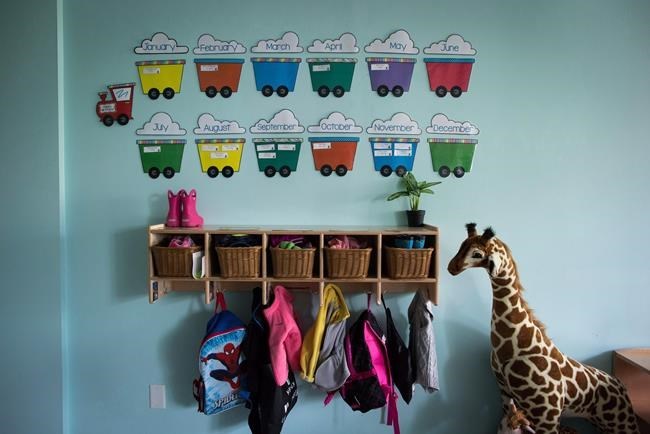A $30-billion federal funding initiative launched in 2021 to bring $10-a-day child care across Canada has created a fraction of the new spaces expected in the first year of operation in three provinces that were assessed, a new report said.
An analysis by public-policy group Cardus said the roll out of child-care expansion programs in British Columbia, Saskatchewan and New Brunswick have all stumbled with a "slow start" and "underwhelming results."
The report said the provinces missed a majority of targets on items such as new spaces, spending and public accessibility to affordable child care.
Cardus family program director Peter Jon Mitchell said Saskatchewan received about $114 million in the first year of its agreement with the federal government but only brought about 37 per cent of the 6,000 new child-care spaces it had hoped to create during that period.
New Brunswick, which received $55 million in its first year under an agreement, created 300 new child-care spaces out of a targeted five-year total of 3,400 spots.
In British Columbia, $349 million in federal funding in the first year of its deal created more than 1,200 new child-care spots, higher than the original provincial target of 850.
But the study also showed that B.C. would have to create 7,000 new child-care spaces in the last four years of its agreement with the federal government to reach the targeted goal of 30,000 seats under the original plan.
"It's one thing to make funding announcements between the provinces and the federal government," Mitchell said of the results. "It's quite another thing to implement it.
"And I think what we're seeing from the first-year results is that it is quite difficult to implement these programs across complex systems."
The federal government signed separate, five-year funding agreements with provinces and territories in 2021, committing up to $30 billion toward the establishment of $10-a-day child care.
Each jurisdiction committed to annual updates on how programs are progressing, but Mitchell said the report covered the three provinces because they were the only ones to have published data so far.
According to the statistics, B.C. spent 11 per cent of its $349 million in federal funding from the initiative in its first year, while only nine per cent of the funding set aside for Indigenous child care was allocated.
New Brunswick spent $5.5 million of its first-year funding of $55 million, mostly on operational grants to existing child-care providers, Mitchell said.
The data on Saskatchewan's spending in year one was incomplete because the province did not include money spent on planning and administration, a move that the Cardus report called " a significant shortcoming in public accountability."
"All in, it's a $30-billion program over five years, and each of the agreements does specify that transparency is important," Mitchell said.
"So, it's making sure that governments … are accountable for the funding that they receive and for the targets that they set. I think it's very important to follow that and to understand where that money is going."
Mitchell said the shortage of early-childhood educators was a major complicating factor for the provinces that are struggling to boost child-care capacity.
There were also factors more specific to the situation at each province, such as New Brunswick's reliance on for-profit operators for the child care, while federal funding favours non-profit providers.
The Cardus report says for-profit operators accounted for 68 per cent of the province's child-care spaces, but New Brunswick's federal agreement limits such operators to about 30 per cent of new-space allocations under the initiative, a discrepancy that Mitchell said will need to be addressed.
In a written response to the reports, a Saskatchewan Ministry of Education spokeswoman said the province signed its deal with the federal government "almost half way through the first fiscal year of the agreement, "and its numbers showed it had spent about $51 million of the $114 million received from Ottawa in year one."
The statement said the leftover amount was carried over and "fully spent" in the 2022-2023 fiscal year, and Saskatchewan had created 5,710 new child-care spaces between April 1, 2021, and June 30, 2023.
"Saskatchewan has invested in the early childhood educator workforce," the statement said. "These include investments into early childhood educator wages, tuition-free post-secondary education, grants to support individuals to take training and public awareness campaigns to encourage more people to join the sector."
The B.C. government said in its written response that the province has funded the creation of "thousands more" child-care spaces and expanded access to the Aboriginal Head Start program for Indigenous early-childhood education.
The statement said the province is in the process of developing its action plan for child-care support for the three fiscal years ending in 2026 as it relates to the federal funding.
B.C. has also increased affordability for child care through changes such as reducing fees at "participating licensed" operators, and there are currently more than 13,200 ChildCareBC spaces offering care at no more than $200 a month, it said.
New Brunswick's provincial government did not issue responses to the report in time for publication.
— With files from Jeremy Simes in Regina
This report by The Canadian Press was first published Oct. 12, 2023.
Chuck Chiang, The Canadian Press



